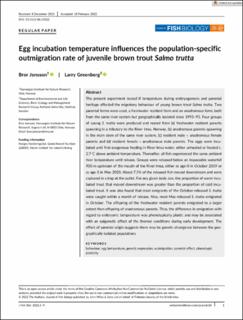Egg incubation temperature influences the population-specific outmigration rate of juvenile brown trout Salmo trutta
Peer reviewed, Journal article
Published version

Åpne
Permanent lenke
https://hdl.handle.net/11250/2995009Utgivelsesdato
2022Metadata
Vis full innførselSamlinger
- Publikasjoner fra CRIStin - NINA [2364]
- Scientific publications [1392]
Originalversjon
10.1111/jfb.15022Sammendrag
The present experiment tested if temperature during embryogenesis and parental heritage affected the migratory behaviour of young brown trout Salmo trutta. Two parental forms were used, a freshwater resident form and an anadromous form, both from the same river system but geographically isolated since 1993–95. Four groups of young S. trutta were produced and reared from (a) freshwater resident parents spawning in a tributary to the River Imsa, Norway, (b) anadromous parents spawning in the main stem of the same river system, (c) resident male anadromous female parents and (d) resident female anadromous male parents. The eggs were incubated until first exogenous feeding in River Imsa water, either unheated or heated c. 2.7C above ambient temperature. Thereafter, all fish experienced the same ambient river temperature until release. Groups were released below an impassable waterfall 900 m upstream of the mouth of the River Imsa, either as age-0 in October 2019 or as age-1 in May 2020. About 7.5% of the released fish moved downstream and were captured in a trap at the outlet. For any given body size, the proportion of warm incubated trout that moved downstream was greater than the proportion of cold incubated trout. It was also found that most emigrants of the October-released S. trutta were caught within a month of release. Also, most May-released S. trutta emigrated in October. The offspring of the freshwater resident parents emigrated to a larger extent than offspring of anadromous parents. Thus, the difference in emigration with regard to embryonic temperature was phenotypically plastic and may be associated with an epigenetic effect of the thermal conditions during early development. The effect of parental origin suggests there may be genetic divergence between the geographically isolated populations. behaviour, egg temperature, genetic expression, outmigration, parental effect, phenotypic plasticity
